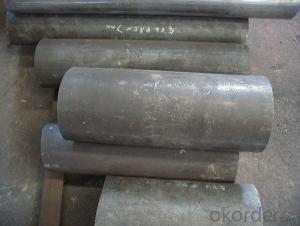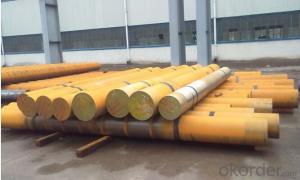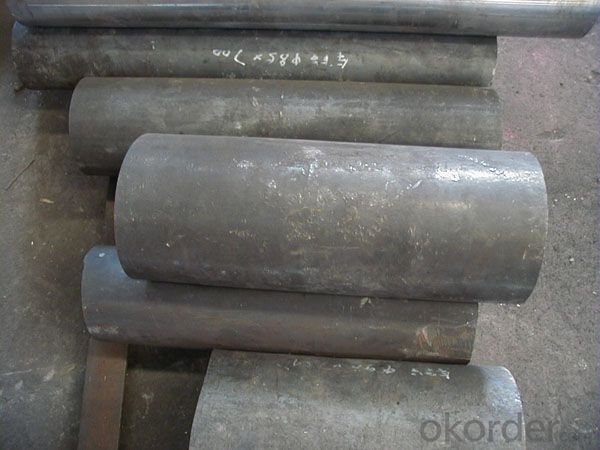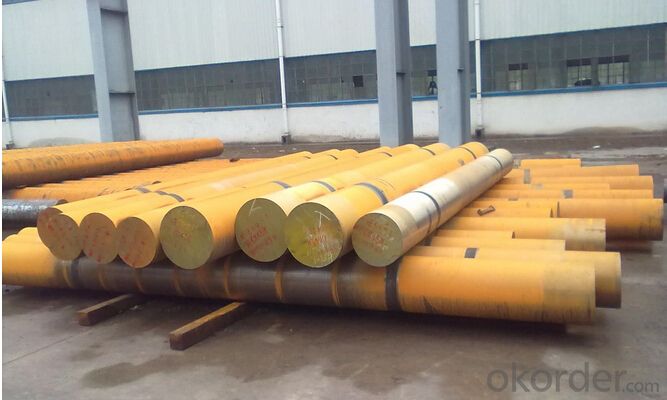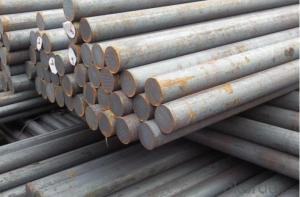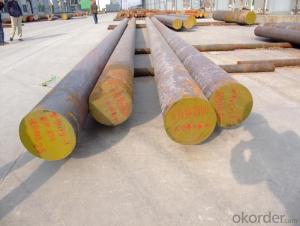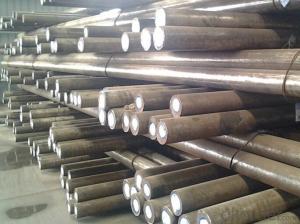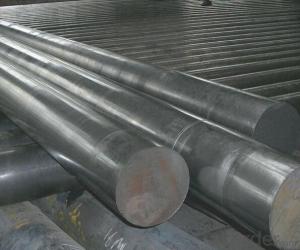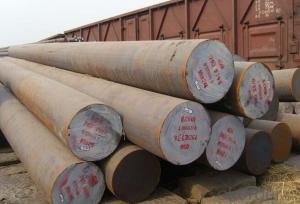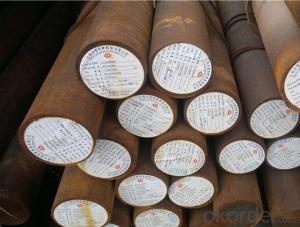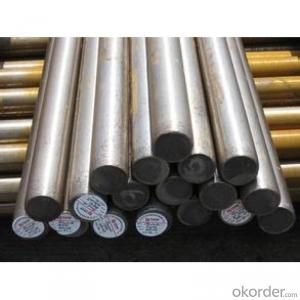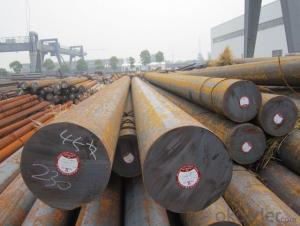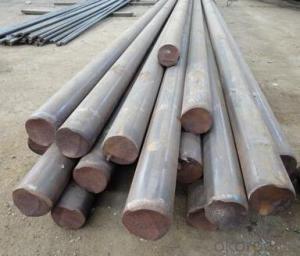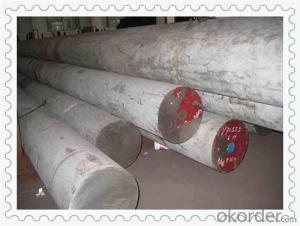Special Steel SAE 1050 Carbon Steel Steel Round Bar
- Loading Port:
- China main port
- Payment Terms:
- TT OR LC
- Min Order Qty:
- 25 m.t.
- Supply Capability:
- 10000 m.t./month
OKorder Service Pledge
OKorder Financial Service
You Might Also Like
Specification
The details of our Steel
1. Produce Standard: as the GB, AISI, ASTM, SAE, EN, BS, DIN, JIS Industry Standard
2. Produce processes: Smelt Iron -EAF smelt Billet - ESR smelt Billet -Hot rolled or forged get the steel round bar and plate
3. Heat treatment:
Normalized / Annealed / Quenched+Tempered
4. Quality assurance:
All order we can received Third party inspection, You can let SGS, BV,.. and others test company test and inspect our products before Goods shipping.
Product information
| SAE 1050 Carbon Steel Price Per kg Weld Socket Carbon Steel | |||||||||||||
1.Specification of sae 1050 carbon steel | |||||||||||||
Round bar | Diameter(mm) | Length (mm) | |||||||||||
100~300 | 2000~5800 | ||||||||||||
Plate | Thickness(mm) | Width (mm) | Length (mm) | ||||||||||
20~70 | 105~610 | 2000~5800 | |||||||||||
The specification can be customised! | |||||||||||||
2.Chemical compositon of sae 1050 carbon steel | |||||||||||||
NO. | C | Mn | Si | Cr | Cu | Ni | P | S | |||||
sae 1050 carbon steel | 0.47~0.55 | 0.50~0.80 | 0.17~0.37 | ≤0.15 | ≤0.25 | ≤0.30 | ≤0.035 | ≤0.035 | |||||
3.Delivery condition of sae 1050 carbon steel | |||||||||||||
σb (MPa): ≥630(64) | σs (MPa): ≥375(38) | δ5 (%): ≥14 | Akv (J): ≥31(4) | ||||||||||
αkv (J/cm²): ≥39(4) | ψ (%): ≥40 | Hardness: HB180~220 | |||||||||||
4.Heat treatment of sae 1050 carbon steel | |||||||||||||
Acc. to your request, Standard steel bar(sawing) , non standard steel bar(sawing) or Mill deliver condition,without sawing or cutting,Conventional or ESR, hot rolled or forged, black surface or milling, Hardness: annealed to HB≤207. | |||||||||||||
1.EAF: Electric Furnace+LF+VD(Optional) | |||||||||||||
5.Characteristic of sae 1050 carbon steel | |||||||||||||
(1) Higher strength in a high-quality carbon steel. | |||||||||||||
(2) Mechanical properties of this steel is very good. | |||||||||||||
(3) due to poor hardenability, general normalized state, high mechanical performance requirements, the use of quenched and tempered. | |||||||||||||
(4) Moderate in cold plastic deformation, the machinability by annealing and normalizing is better than quenched and tempered. | |||||||||||||
6.Application of sae 1050 carbon steel | |||||||||||||
(1) used in the manufacture of high wear resistance is required. | |||||||||||||
(2) For the machining parts and spring pieces with little dynamic and impact loads, such as forging gear, rod, roll axis, friction plate, agricultural earthmoving plowshare, heave-duty spindles etc. | |||||||||||||
Main product
High speed steel | |
AISI | M2,M4,M35,M42,T1 |
DIN | 1.3343,1.3243,1.3247,1.3355 |
JIS | SKH51,SKH54,SKH35,SKH59,SKH2 |
Cold work tool steel | |
AISI | D2,D5,D3,D6,A8,A2,O1 |
DIN | 1.2379,1.2601,1.2080,1.2436,1.2631,1.2363,1.2510,1.2327 |
JIS | SKD10,SKD11,SKD1,SKS3 |
Hot work tool steel | |
AISI | H13,H11,H21 |
DIN | 1.2344,1.2343,1.2367,1.2581,1.2713 |
JIS | SKD61,SKD6,SKD7,SKD5SKT4 |
Plastic mould steel | |
AISI | P20,P20+Ni,420 |
DIN | 1.2311,1.2738,1.2083,1.2316 |
JIS | PDS-3,SUS420J1,SUS420J2 |
Alloy structural seel | |
AISI | 5140,4340,4135,4140 |
DIN | 1.7035,1.6511,1.7220,1.7225 |
JIS | SCr440,SNCM439,SCM435,SCM440 |
Stainless steel | |
AISI | 440C,420,430 |
DIN | 1.4125 |
JIS | SUS440C |
Carbon steel | |
AISI | 1045,1020 |
DIN | 1.1191 |
JIS | S45C, G3101 |
Product show

Workshop show

Shipping
1. FedEx/DHL/UPS/TNT for samples, Door-to-Door;
2. By Air or by Sea for batch goods, for FCL; Airport/ Port receiving;
3. Customers specifying freight forwarders or negotiable shipping methods!
Delivery Time: 3-7 days for samples; 5-25 days for batch goods.
Payment Terms
1.Payment: T/T, L/C, Western Union, MoneyGram,PayPal; 30% deposits; 70% balance before delivery.
2.MOQ: 1pcs
3.Warranty : 3 years
4.Package Informations: 1) EXPORT, In 20 feet (GW 25 ton) or 40 feet Container (GW 25 ton)
2)as customer's requirement
Why choose us?
(1) The leading exporter in China special steel industry.
(2) Large stocks for various sizes, fast delivery date.
(3) Good business relationship with China famous factories.
(4) More than 7 years steel exporting experience.
(5) Good after-sales service guarantee.
- Q: What are the different methods for improving the toughness of tool steels used in special steel?
- Tool steels used in special steel applications can be toughened through various methods. The goal is to increase their resistance to fracture and ability to absorb energy without becoming brittle. Some techniques for improving the toughness of tool steels include: 1. Alloying: Adding specific alloying elements like chromium, molybdenum, vanadium, and tungsten significantly enhances the toughness. These elements form carbides within the steel matrix, improving toughness. 2. Heat treatment: Proper heat treatment greatly improves toughness. Quenching and tempering are commonly used processes. Quenching rapidly cools the steel, resulting in a hardened structure. Tempering involves reheating and slow cooling to relieve internal stresses and increase toughness. 3. Controlled cooling rates: Optimizing toughness is possible by controlling the cooling rate during heat treatment. Slow cooling allows for a more uniform microstructure, leading to improved toughness. 4. Grain refinement: Refining the grain size enhances toughness. This can be achieved through hot working, controlled rolling, or adding grain refining elements like titanium or zirconium. 5. Surface treatments: Shot peening or nitriding can improve toughness. Shot peening bombards the steel surface with small metal or ceramic particles, creating compressive residual stresses that enhance toughness. Nitriding diffuses nitrogen into the surface, forming a hard and wear-resistant layer. 6. Cryogenic treatment: Subjecting the tool steel to extremely low temperatures for an extended period refines the microstructure and reduces residual stresses, improving toughness. 7. Powder metallurgy: Techniques like hot isostatic pressing or sintering can produce tool steels with improved toughness. Fine powder, high pressure, and temperature result in a more uniform and fine-grained microstructure, increasing toughness. Ultimately, the specific methods selected and combined depend on the tool steel's requirements and intended application. By carefully considering these techniques, manufacturers can enhance the toughness of tool steels for demanding special steel applications.
- Q: What are the main advantages of using special steel in the marine industry?
- The main advantages of using special steel in the marine industry are its exceptional strength, durability, and corrosion resistance. Special steel can withstand harsh marine environments, including exposure to saltwater and extreme weather conditions, without corroding or deteriorating. Its high tensile strength allows for the construction of lighter and more fuel-efficient ships, while still maintaining structural integrity. Additionally, special steel offers excellent weldability and formability, making it easier to fabricate complex and intricate marine structures. Overall, the use of special steel results in safer, more reliable, and longer-lasting vessels in the marine industry.
- Q: What are the different special steel products available in the market?
- There are a wide variety of special steel products available in the market, each designed to meet specific industrial needs. Some of the common special steel products include: 1. Stainless Steel: This is a corrosion-resistant steel alloy that contains a minimum of 10.5% chromium. It is widely used in applications that require high resistance to corrosion, such as kitchen utensils, medical instruments, and chemical processing equipment. 2. Tool Steel: Tool steel is a type of carbon and alloy steel that is specifically designed to be used in the manufacturing of tools. It is known for its high hardness, resistance to abrasion, and ability to retain sharp edges. Tool steel is commonly used in the production of cutting tools, dies, and molds. 3. Alloy Steel: Alloy steel is a steel that has been alloyed with other elements, such as manganese, silicon, nickel, or chromium, to enhance its mechanical properties. It offers improved strength, toughness, and wear resistance compared to carbon steel. Alloy steel is used in various applications, including automotive components, construction equipment, and machinery parts. 4. High-Speed Steel: High-speed steel is a type of tool steel that is capable of cutting at high speeds without losing its hardness or ability to retain sharp edges. It is commonly used in the production of drills, milling cutters, and saw blades. 5. Spring Steel: Spring steel is a low-alloy, medium or high carbon steel that is known for its ability to retain its shape and elasticity even under high stress or repeated loadings. It is widely used in the manufacturing of springs, suspension systems, and shock absorbers. 6. Electrical Steel: Electrical steel, also known as silicon steel, is a specialized steel alloy that exhibits low electrical losses and high magnetic permeability. It is used in the production of electrical transformers, motors, and generators. 7. Heat-Resistant Steel: Heat-resistant steel is designed to withstand high temperatures without losing its mechanical properties. It is commonly used in applications such as furnaces, heat exchangers, and gas turbines. These are just a few examples of special steel products available in the market. The choice of steel product depends on the specific requirements of the application, including factors such as corrosion resistance, strength, hardness, and heat resistance.
- Q: How does special steel contribute to the machinability of products?
- The role of special steel in enhancing product machinability is substantial. Machinability refers to a material's ease of being cut, drilled, or shaped through various machining processes. Special steel, also known as alloy steel, is formulated with specific elements that improve its machinability. One vital aspect of special steel that enhances its machinability is its composition. By incorporating elements like manganese, sulfur, and phosphorus, special steel achieves superior machinability compared to regular carbon steel. These elements reduce friction during machining, resulting in less tool wear and longer tool lifespan. Additionally, they facilitate the formation of smaller, more manageable chips during cutting, making it easier to control the machining process and maintain dimensional accuracy. Furthermore, special steel often undergoes specific heat treatment processes like annealing or quenching and tempering to further enhance its machinability. Heat treatment improves the steel's microstructure, making it more uniform and refined, consequently improving its machinability characteristics. Heat-treated special steel exhibits improved hardness, toughness, and resistance to wear, all of which are crucial for achieving high-quality machined products. Moreover, special steel can be engineered to possess other desirable properties such as high strength, corrosion resistance, or heat resistance while still maintaining good machinability. This versatility allows manufacturers to select the most suitable special steel for their specific machining applications, ensuring optimal performance and productivity. In summary, special steel plays a significant role in product machinability due to its specific composition, heat treatment processes, and versatile properties. By utilizing special steel, manufacturers can achieve better machining performance, improved tool lifespan, and higher dimensional accuracy, ultimately resulting in superior quality products.
- Q: Can special steel be used in the construction equipment manufacturing industry?
- Yes, special steel can be used in the construction equipment manufacturing industry. Special steel, such as high-strength or wear-resistant steel, can provide enhanced durability and performance to construction equipment, making it suitable for demanding applications in the industry.
- Q: Can special steel be used in the plumbing industry?
- Yes, special steel can be used in the plumbing industry. Special steel, such as stainless steel or alloy steel, offers excellent corrosion resistance and durability, making it suitable for various plumbing applications. It is commonly used in pipes, fittings, valves, and other components that require resistance to chemicals, high pressure, and extreme temperatures.
- Q: What are the different coating options available for special steel?
- Some of the different coating options available for special steel include galvanizing, powder coating, electroplating, and organic coatings such as epoxy or polyurethane. These coatings provide protection against corrosion, enhance durability, and improve the aesthetics of the steel.
- Q: How does special steel contribute to the efficiency of industrial equipment?
- Special steel contributes to the efficiency of industrial equipment by offering superior strength, durability, and resistance to wear and tear. Its unique properties enable the production of lighter and more compact equipment, resulting in reduced energy consumption, increased productivity, and improved overall performance. Additionally, special steel's high corrosion resistance helps to prolong the lifespan of industrial equipment, reducing maintenance costs and enhancing operational efficiency.
- Q: How does tool steel maintain its hardness at high temperatures?
- Tool steel maintains its hardness at high temperatures due to its high carbon content and alloying elements. The high carbon content allows for the formation of carbides, which are extremely hard and stable even at elevated temperatures. Additionally, the alloying elements in tool steel, such as chromium, tungsten, and molybdenum, form secondary carbides that further enhance the steel's hardness and heat resistance. These carbides act as strengthening agents, preventing the steel from losing its hardness and maintaining its performance even under high-temperature conditions.
- Q: What are the properties of titanium alloys?
- Titanium alloys have several properties that make them highly desirable in various industries. Firstly, they have excellent strength-to-weight ratio, which means they are strong and lightweight. This property makes them suitable for applications where strength and durability are required, such as aerospace engineering. Secondly, titanium alloys have high corrosion resistance, even in harsh environments. They form a protective oxide layer on their surface, which prevents them from corroding. This characteristic makes them ideal for marine and chemical processing industries. Thirdly, titanium alloys have a high melting point, allowing them to withstand extreme temperatures without losing their structural integrity. This property makes them suitable for applications in the automotive, defense, and power generation sectors. Furthermore, titanium alloys are biocompatible, meaning they are well-tolerated by the human body and are often used in medical implants and prosthetics. Overall, titanium alloys possess a unique combination of strength, lightweightness, corrosion resistance, high melting point, and biocompatibility, making them highly valuable and versatile materials in various industries.
Send your message to us
Special Steel SAE 1050 Carbon Steel Steel Round Bar
- Loading Port:
- China main port
- Payment Terms:
- TT OR LC
- Min Order Qty:
- 25 m.t.
- Supply Capability:
- 10000 m.t./month
OKorder Service Pledge
OKorder Financial Service
Similar products
Hot products
Hot Searches
Related keywords
